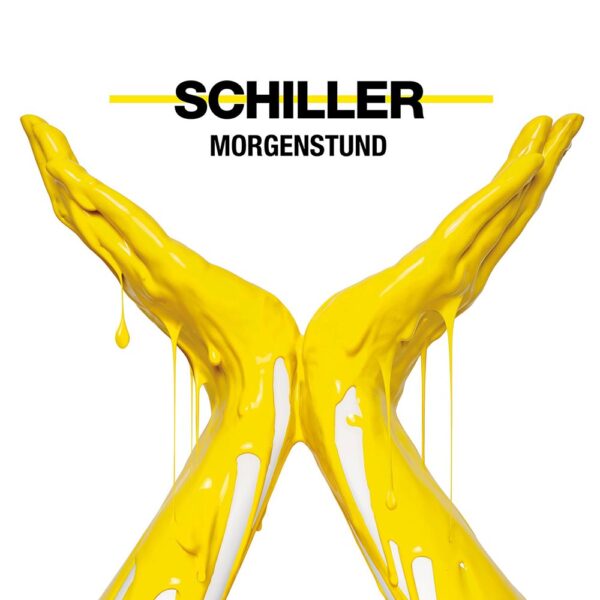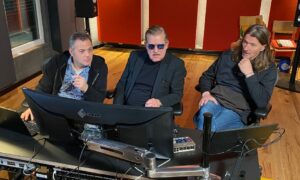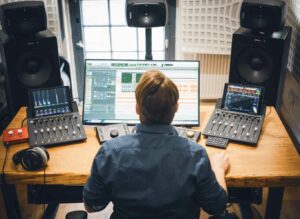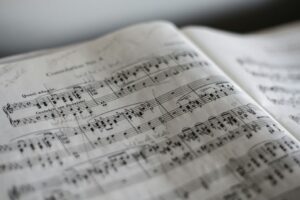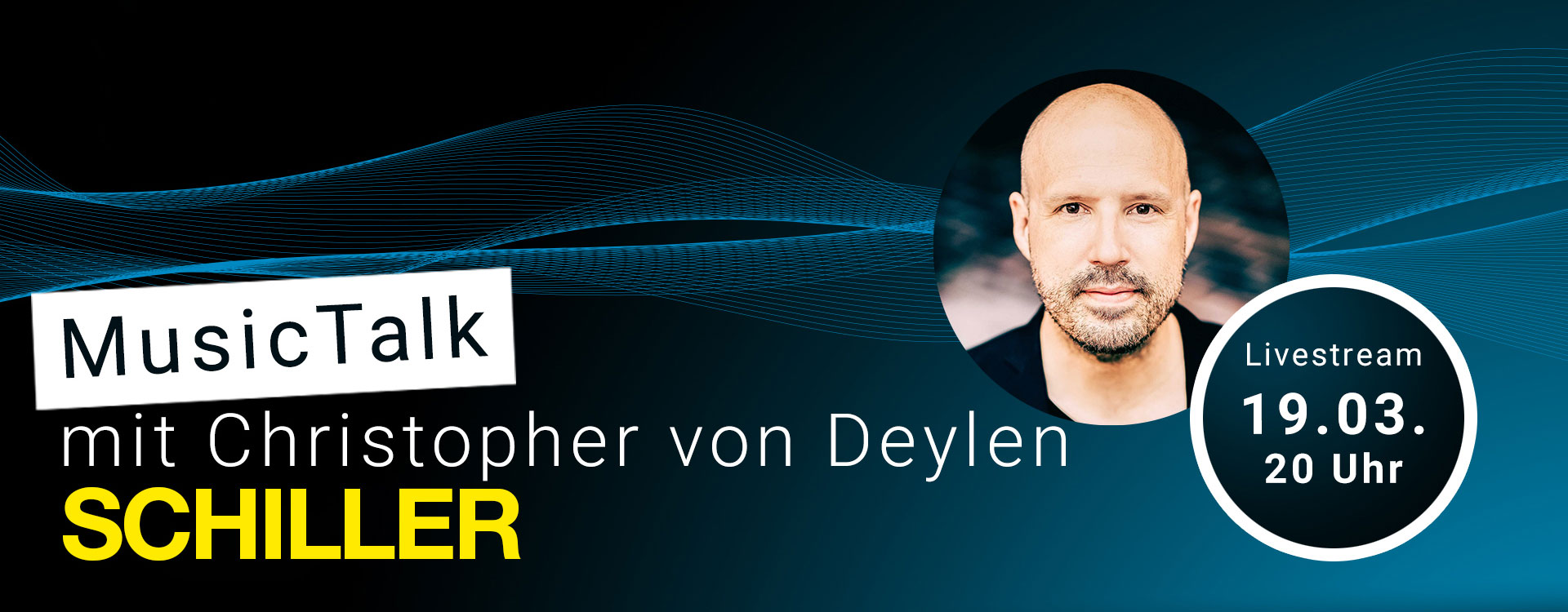
Christopher von Deylen aka Schiller talks live with us and Patrick from grobi.tv about his new album Summer in Berlin. Of course, we are particularly interested in what makes the exclusive Studio & Home Cinema Pure Deluxe Edition so special – keyword immersive music. Here is the link to the stream and afterwards the recording as video-on-demand. For those who prefer to read, here is the text summary of the interview with Schiller.
Would you like to briefly describe your career?
I’ve always been very enthusiastic about electronic music and in 1982 I listened to Tangerine Dream, Kraftwerk and whatever else you hear when you connect your heart with electronic music. My dream was always to be able to make this music myself, and it was always most exciting for me to work behind the scenes. I never really wanted to go on stage, never really wanted to become an artist, but rather it was exciting for me to let off steam in the music lab, i.e. in the studio.
And that’s what I did, and then I started earning money during the summer breaks in order to slowly save up a little studio and then, via many detours and coincidences, I got a little closer to the music industry as an intern in a recording studio in Hamburg.
With all the musicians who recorded there, I was also encouraged not to want to go on stage. And at night I tried to learn the whole technique according to the principle “learning-by-doing”. Learning what a compressor is, how to use the mixer and everything else. One is making and composing music and the other is recording music. And so, over many years, I learned the tools of the craft and taught myself. I also made many mistakes, but you always learn the most from those. Everything that came after that started in 1998 with the first Schiller single “Das Glockenspiel”. It’s still like a dream, I still can’t really realize it and it’s still hard for me to describe it myself because it’s so autobiographical, you know, but I’d much rather look forward. The most important thing is still the search.
I’m actually still doing what I did when I was on summer break sitting in my little studio in northern Germany in the boonies. Then I slowly started to create the pieces with the DX21, a completely unusable synthesizer, and a small four-track cassette player. But really just for me for the fun of it, or for the passion of the artistic, or to make the music that I want to hear, but that you can’t buy. So I made it myself and I still do, actually. And I am quite happy that there are so many people who also like this music. That was never the plan to be on stage, but it’s also a lot of fun for me now. I am very grateful for the loyalty and curiosity of the audience.
Not having originally intended to play in front of people and yet now performing in front of thousands is certainly a special development. Can you still remember your first gig?
My very first gig was in Hamburg on the Reeperbahn in a small club that doesn’t even exist anymore. That was at the time when the album Weltreise had just come out, in 2001. At that time, there was a format on Arte called Arte Tonight. There were always several artists presented with a short concert, I think it was about 45 minutes. I was asked if I could imagine that, so I said no at first.
However, they asked again with increased intensity whether that would not be an option at least once and I let myself be persuaded, so to speak. This step was very difficult for me at the time because you have your own time calculation in the lab; you can work away and if you don’t make any progress, you continue the next day. You can’t do that on stage, it always has to work. That was a big change for me, because I can’t play the piano that well either. And for those 45 minutes I had to learn a lot of other things at once. There was no question at all that I would do it once and never again.
And this was live and not with musicians?
Yes, it was already with musicians. There was even Gary Wallis with me, he helped me get through that panic and really dare to do that.
You’ve heard that from other artists, that it’s so great on stage with the audience and the energy, and that was always a bit suspicious to me, because I didn’t know that. I thought it was like when theater actors say theater is much better than film because it’s much more organic and much more atmospheric. It always sounded so recited, so dishonest.
And then I stood there in this little club in front of maybe fifty, sixty people who had also been invited. There were no tickets to buy, but people were happy that someone came. And after half an hour I realized that going on stage is like a roller coaster ride. You’re scared, you panic, and you hope everything goes well, and then when you get through it, you want to go right back. And that’s basically the answer to the question: as you can tell, I remember my first gig very well.
Of course, every concert is a bit like the first concert, because even if you rehearse for a long time or do a long tour where the setlist doesn’t change every day – you might gain some experience, but it never becomes a routine. And if you find that you’re going there like you’re going to work, then maybe you should stop.
I think it’s also because of this energy that so many bands are still performing even in their old age. This feeling and this energy only exists there, you can’t stream it or save it. I once had a very long talk about this with Udo Jürgens, who was still doing it at a very old age – for him, it was the elixir of life right up to the end. And that’s actually how it has to be.
Last year you even played live in front of cars like in a drive-in theater – how was the interaction with the audience?
It already seems as if that was a different life. It was all still very fresh then. In fact, we only had a few weeks behind us in which things were a bit quieter. Then there was the idea of playing in drive-in theaters, just according to the possibilities as far as social distancing was concerned. This was a new experience for all of us. The first concert was in Düsseldorf and for me that was knitted with the hottest needle ever. The result was mixed because there were major problems with the technology. It didn’t turn out the way it should have.
I am very grateful to Torsten Quaeschning from Tangerine Dream, because he was also involved. It really saved my life and at least the rest of the evening for the audience, or so I hope. That was really an extremely steep learning curve. I then tried to bring this in at the next concert in Mannheim “Lichtsommer” to make up for it. Here we were a little bit more advanced, because there was an area in front of the cars, where small groups were allowed to be in deck chairs, lounge-like, even without cars. I think that the idea of playing in a drive-in theater is certainly not the thing when everything is back to normal, where people will say, “Oh come on, let’s go back to playing in front of cars. That was much nicer.” But, of course, that was the time to try something like that. Of course, you could have said, I’d rather not do that, I’d rather stay at home.
There were some artists who expressed themselves in this way. But doing nothing at all is not a solution. That was an experience for everyone, but yes, from today’s point of view, it is already quite inseparable from that time and where one day you might say, “Remember?”
If you don’t dare to do things or don’t do things that you would have imagined differently, then you won’t have these experiences. They may be obstinate at the moment and you think, I don’t know. But when that heals a little bit, I hope one looks at it a little more mildly.
Your tour dates have already been postponed again.
Yeah, that was about the hardest walk I can remember. So far, in the twenty years, there have only very rarely really been postponements or cancellations. I don’t want to say they never existed, but it was really rare. And then having to postpone appointments twice in a very short period of time, and now even having to cancel appointments the second time, that’s not nice. It also doesn’t help to retreat to the fact that others feel the same way. That’s not much help. No matter how devoid of alternatives this is, of course. Even if you wanted to, you wouldn’t be allowed to play at all. It is what it is, we will somehow survive this too.
Of course, I’m very sorry for the audience and for all of us and I very much hope that we can somehow make it up to them in 2022. Maybe there will be a new album by then, a new Christopher von Deylen album. And maybe then you can say, OK, we didn’t choose this, but we made the best of it.
Where does your stage name Schiller come from?
That was in 1998 in this period where one tried quite a lot. In the studio there were always two TVs running VIVA and MTV. One perceived music quite differently and one was also quite differently dependent on how one approached music. It wasn’t as easy as it is today. There was a bell melody in the studio that sort of came naturally. That was one of those moments that you’re actually still chasing – that moment where a piece writes itself. You read something like that from time to time, like the Beatles told you that Yesterday was written in half an hour. The title was found quite quickly, because it was a bell melody. So I called the piece Das Glockenspiel. This was at a time when many German producers wanted to give the impression that they came from England. So people gave themselves English pseudonyms if possible or tried to adopt an English image. This even went so far that some DJs sent their samples to England first, so that the package would have an English stamp. This meant that it was supposedly worth more than if it came from Bochum, for example.
But to do the opposite of all that, I thought it had to be a German name. That’s how I got from Das Glockenspiel to “Die Glocke” the poem by Friedrich Schiller, and thus finally to the name Schiller, which I borrowed. But I was completely unaware that the name would accompany me for so long. I thought it would all come to nothing anyway. If I had been told to choose a name that I would be married to for another twenty years, I probably would never have chosen Schiller. But I’m very happy that Schiller is called Schiller, and I try to honor the name as best I can.
You travel a lot and that is often reflected in the productions. What happens there exactly?
I was in Beirut in January 2020. Of course, this sounds insanely mundane because it’s such a calendar saying, but the journey is the destination. In my little world, that also applies to travel. Of course it’s great to go somewhere beautiful, I used to do that more often. But I haven’t found the peace to recover and I don’t even know what I’m supposed to recover from, because what I’m doing is fun. What I do is my life, it’s not work in that sense.
When you travel in a way where you experience the unexpected, where things can happen that are not in any travel guide, then your view changes. Then things happen that you don’t necessarily translate into music. Of course, every now and then you walk around with a field recorder and record something – but that’s usually not used at all. It’s like the equivalent of a photograph – you capture something, but most of the time it ends up in the archive.
Traveling somehow creates an openness and perhaps a certain tension in me, but I don’t notice it until I’m back in the studio. The image of me sitting there somewhere on the mountain making music is romantic, but it’s not like that. While on the road, it’s more about filling your brain and heart with experiences that you can draw on later in the studio. This can also come years later.
But of course I can’t say how things would sound if I hadn’t made certain trips now.
And of course it’s also something different when I go to Iran, for example, like with Morgenstund, to perform there with other musicians. This is more like a company outing.
Morgenstund was the first album that you mixed in Dolby Atmos – is that something that was already part of the composition or does it come afterwards? Are you already thinking about a certain spatiality when you write?
That has changed. The first time I sat in a movie with Dolby Atmos, there might have been a whirring sound from above. From Dolby’s point of view, I understood that – after Dolby Surround, something else had to come. Personally, however, I didn’t see the added value at all. Then there was Morgenstund and I thought it would be interesting to see what it would be like to bring some pieces that I thought were suitable into a Dolby Atmos world. And I was surprised and fascinated by what a difference it made. What a creative scope this suddenly offers, which cannot be reproduced at all in stereo, but neither in surround.
When I was sitting in the studio with Bodo Schulte, when we did that, and you could switch the individual groups on and off – stereo, surround and the speakers on top – the most striking difference was when you switched off the speakers on top. It was clear then that the format had an insane amount of potential and that one would actually have to make music specifically for it.
It’s hard to describe, you’re talking about something you really have to experience. Maybe you can hear it at a friend’s house who has a Dolby Atmos system, or in a store if they’re ever open again. Especially with music, there really is a tremendous difference that you can achieve.
And “Berlin – Moscow” was also conceived as a Dolby Atmos piece from the outset. There it was clear that the Dolby Atmos version is the main version that shows how the piece is really meant. And that will certainly accompany me in the future.
I listened to a test car a few days ago where a Dolby Atmos system was installed, and it was totally fascinating. In the car, of course, you have time, you can’t run away, and you’re always sitting in the right position in relation to the speakers – there’s a completely different intensity again.
It would be great if the format could establish itself beyond the home theater in vehicles, because you can listen to music in a completely different way there anyway.
We consider Dolby Atmos and immersive music to be something that will be with us for a very long time. Once you hear it, you don’t want to hear it normally.
Yes, I felt the same way. You read that and think, nice, another logo. But once you’ve heard it, if it’s used judiciously and discreetly, it really opens up worlds. It’s equivalent to 3D movies: there are those that are loud and constantly tell you that you’re in a 3D movie, and then there are those that are really well done.
You always have elaborate lighting elements in your shows. How do you think about light in terms of your compositions?
The light is indeed extremely important. Of course, on the very first tours I was still very shy and didn’t really dare to articulate myself and say that I wanted something red there and something white there. Then I always stood nervously next to the lighting console, because I wanted to turn it as well. Even though I still don’t fully understand how this works. But in the meantime my confidence has grown and the light preparation takes as much time as the musical preparation.
Light is so exciting because I can expand the stage space with light. When I work with beams of light and direct them not only onto the stage, but into the space, then it’s like a means of transport with which you bring emotions into the space. Of course, the musical tuning is insanely important. One tries to emphasize musical elements with light and to present them as an interlocked unit like a film.
How do you think about the topic of immersive music for events? Could you imagine that for your live shows?
In the above moment at Morgenstund when we mixed the Dolby Atmos tracks and I realized what a difference it makes, I actually wanted to do the whole 2019 arena tour in Atmos. But that was at a stage when the tour was already technically planned and there are no points in the halls where you would have to hang the speakers.
But I can imagine it very well, either as part of a tour, or when I think of “Berlin – Moscow”, perhaps at a venue that is not a typical concert hall. A place where, in addition to light, sound is part of the architecture and you can show that to a large audience.
Binaural audio is also available on your album – i.e. spatial listening via headphones. What does that mean to you?
Yes, of course this is something that is actually not possible: two channels are two channels, so stereo is stereo. But there have been attempts for many years to make the sound more spatial. I think that even with the greatest algorithm and the greatest processor, you can’t make it sound so deceptively real that you really think there’s something there. But what you can do with binaural sound is somehow expand the stereo image to make it sound more open and bigger. This is not suitable for every piece, but there are some tracks that sound a bit more open and a bit more like a wide band.
Do you like listening with headphones? Is it more intense?
Yes,… I do like to listen with headphones. Of course, you’re more to yourself and when you go for a walk, there’s almost no other way if you don’t want to put the Mono Bluetooth loudspeaker on your shoulder. What’s missing from headphones, of course, is the truly physical sensation of the sound. Of course, you can open them up and make them really loud, but the musical vibration that reaches the body is not possible with headphones.
I hesitated because I wear headphones all the time to work, of course, and sometimes I’m glad to be able to listen to music that way, without headphones.
How come you have so many impressive guest features? How does it work with the arrangement?
I can’t answer that easily, because it’s always different. There is no scheme or recipe. For now, everything is completely open – everything can, nothing must. You don’t have to know each other that well in private; in fact, sometimes it’s more of a hindrance. As long as there is a musical curiosity about what the other person is doing, and an openness to reveal something of oneself, I find it exciting to risk a musical one-night stand. There are moments when nothing comes out of it, but there are also moments when something can arise that would not have arisen if both had remained for themselves.
Is the impulse then more likely to come from you?
Yes, so far it has mostly been from me. There were rare moments when I was asked. I honestly don’t remember that I wasn’t the one who made the first move – at least in the collaborations that also came to an end.
But of course it’s a great gift when you can really focus on the music and nothing else matters.
I’ll pick out the name Nena now – is it the voice or what is it that made you approach Nena?
Nena has something that I don’t think she even knows she has. There is a carefree sounding nonchalance with which she sings and generally a way of expressing herself that is very special. She also doesn’t think too much about what you say or do or how you act or what people think. That alone is rare, regardless of the musical intensity. I find that very attractive and very remarkable that she still goes her way like that. There is only one Nena.
And then what is the exact work process like? Is there a clear plan?
There is actually no blueprint there either. It can be that you figuratively lock yourself together and after two or three hours the piece is finished. It can also be that you lock yourself in and nothing happens. Then you might do it again a few days later. Of course, this also has to do with the fact that I like to be very much on my own and feel most comfortable in my sound lab. I know my way around and know where every button is. And you also have stage fright when you get involved with another artist, another person. Nena is just Nena and Alphaville is Alphaville. Of course you’re nervous, but I’m also nervous with someone who’s not yet so well known, because you’re stepping out of your comfort zone for the first time and because you naturally want what you’re doing to trigger something. But if that’s not the case, because it doesn’t appeal to the person or artist – that can be a tough. Then you are served for the time being and need time for yourself.
You also did a remix of Rammstein: “Ohne Dich”. How did this come about?
That was also a very big coincidence. The song is rather unusual by Rammstein standards as a ballad – a very quiet piece, also very orchestral. They were looking for suitable remixers and because the piece was a bit softer, a bit more melancholic, they thought of me. Of course, I thought that was great and it was a lot of fun.
Of course, it was something very special to load Rammstein’s multitrack project into the computer and make something out of it.
You have to be asked. With Polarkreis 18 and their hit “Allein, allein” (Alone, Alone) I went to the band, or rather to the record company, which was the same one I was with at the time, Universal Music. I really wanted to do a remix to this piece, I would have done it any way, I didn’t even want any money for it because I thought the piece was so brilliant. That also worked. You can do that, of course, offer yourself, but it certainly helps if the person who actually produced the piece wants you to, too.
In addition to your collaborations in the pop field, you also make excursions into classical music. What do they mean to you?
After all, classical music is also music. I think there are really great melodies and exciting artists in classical music. Most of the time, someone who decides to go the classical way plays things that already exist and have been played a hundred times before. So you have to think why would Hélène Grimaud want to play the twentieth version of something. In the classical music business, these are all cover versions, if you will. I find that exciting, because that would never even cross my mind. I couldn’t do that at all. It’s like practicing and practicing and practicing in sports and hoping that one day you’ll be better than an Bernstein or Rubinstein. That’s certainly a sense of ambition, but it’s quite hard to create something new. Sure, there are new compositions, new serious music. But I find the distinction between serious and popular music somewhat dubious. Why does one have to be serious and why is the other just light music? They can also take each other by the hand. That’s the reason why I’m always interested in classical elements in between.
The earlier Schiller single “Ein schöner Tag” was based on an opera by Puccini “Madama Butterfly”. And I’m curious, too, of course. How does a Lang Lang work? What makes him tick?
They are completely different – they do what I never wanted.
I was learning piano and the piano teacher arrived with her stack of notes and I found it boring while I was playing. Why should I play this again now? Others have already done that much better. For me, it was about the new.
And it is exciting to push these artists to try something new.
A little rebel in me also likes to provoke the so-called classical music police, who are very suspicious when you take melodies from classical music into other sound worlds. When you then read a scathing review in the FAZ about the album Opus, you know you’ve done everything right.
Could you also imagine doing music for a film?
Yes, I could very well imagine that. However, the decision alone to want to make film music is not enough. A lot of things have to come together and it would certainly also be a learning curve for me. In film, half is creativity and half is craft. Now, when you have to write music for a scene, that scene often changes again and again. Then you are very busy changing, shortening and adapting the music that you have struggled to make. I might be able to do that – but I’m not sure if I’m up to it. I would like to try this out and I hope there will be a movie someday where I can contribute.
In 2004 you already contributed two songs to “Das Tor zum Himmel”.
Yes, that is correct. That’s where my previous experience comes from. There was a beautiful scene that I really wanted to make the perfect music for.
Then the distributor came and said that the film was too long and that it had to be cut. And so then that scene was cut out and that’s when I was really sad.
Making film music is quite a bit of a job because the director is the boss. You have to deal with that and you can only do that if you have a director or a team where you don’t have to bend too much. I’m usually a lone wolf. I would like to try this again though.
How do you listen to music at home? Do you have a corresponding immersive system?
No, unfortunately I’m not doing that at the moment. When I lived in Berlin, I had a small 5.1 system But I don’t have it anymore. However, I’m currently toying with the idea of getting something – a compact version with which I can listen to immersive music.
That’s definitely something I plan to do – I would love to do that.

